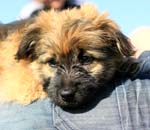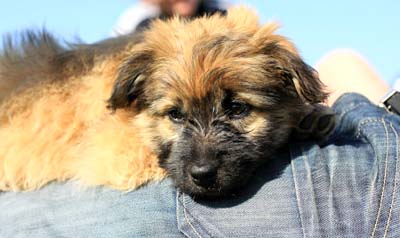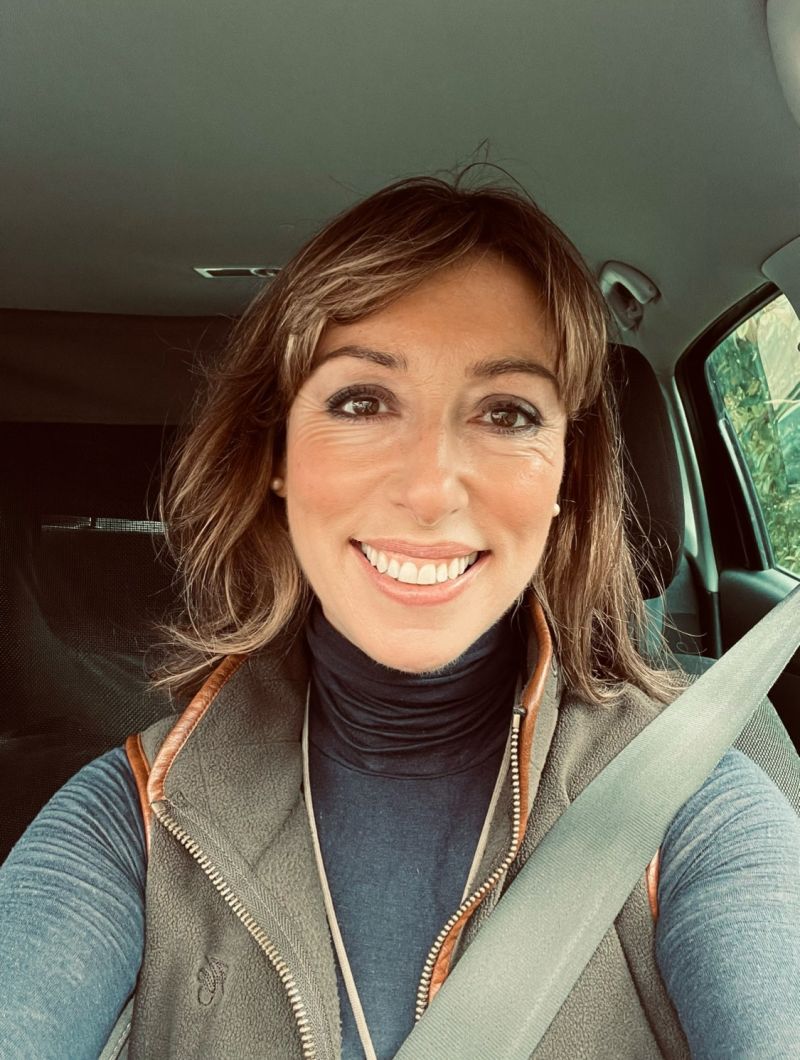Best of Country Life 2012: Devoted dogs
No other animals can really empathise with people like dogs, who bring so much joy and love into their owners’ lives


Eye to eye, with his paws on his master's chest, Theo, a black-and-white springer spaniel, looks with unwavering loyalty into the upturned face of his soldier handler. Captured by a Press Association photographer last year, the picture is all the more poignant as it was taken a few months before they both died.
Trained to uncover hidden explosives, the Royal Army Veterinary Corps sniffer dog and L/Cpl Liam Tasker, 26, who were described as ‘inseparable', were on duty in Helmand in March when L/Cpl Tasker was shot dead. Theo was taken back to Camp Bastion, but had seizures and died within hours of his master. The soldier's family believe that Theo died from a broken heart.
‘Theo's devotion to duty saved countless human lives,' says Jan McLoughlin of the People's Dispensary for Sick Animals (PDSA), which has posthumously decorated the dog with the Dickin Medal (the animal equivalent of the Victoria Cross). This remarkable spaniel made 14 operational finds in two years, the most detected by any arms-and-explosives search dog in Afghanistan to date.
But we don't always need to look to theatres of war to witness dogs' courage and constancy. Many of us see it every day in our pets' implacable reverence for us. My first labrador was as happy when he was riding on trains and escalators in London as he was retrieving a pheasant to hand; my gamekeeper husband's departed and still favourite Jack Russell was likely to bite anyone who so much as put their hand through the Land Rover window, but he had an uncanny knack of turning up at whichever wood my husband was working in, having tracked him from home.
Domesticated dogs have been a huge part of our lives since they descended from grey wolves some 15,000 years ago. About 8.3 million of us in the UK have one. So what is it about this animal-of which Rudyard Kipling warned in The Power Of The Dog: ‘Brothers and Sisters I bid you beware, Of giving your heart to a dog to tear'-that keeps us enthralled?
The heroes of some of the most touching literature and films are dogs: Lassie, the collie who trekked across Scotland to find her family, or Luath the labrador and Bodger the bull terrier in The Incredible Journey. And what would the Famous Five be without Timmy, Tintin without Snowy at his heels or Dorothy with no Toto?
‘It's the only species of animal that volunteers itself into its relationship with us,' says Dr Roger Mugford, a Surrey-based animal behaviourist and farmer, who has advised The Queen about her corgis. ‘Dogs have a natural affinity to humans. They enter into our family, our lifestyle and our social life. They are pre-adapted to live with us in a way that no other species is. We've rubbed along together for a very long time.' In the village of Beddgelert, North Wales, there is the grave of a faithful 13th-century hound.
Exquisite houses, the beauty of Nature, and how to get the most from your life, straight to your inbox.
Llywelyn the Great's dog, Gelert, was unaccountably absent one day when his master went hunting. On the Welsh prince's return, Gelert-smeared with blood joyfully sprang to meet him. But Llywelyn's relief turned to fear and anger when he discovered his baby son's cot empty and the bedclothes and floor covered in blood. Believing the hound had killed his son, the prince plunged his sword into Gelert's side. The dog's dying howl was answered by a child's cry, leading Llywelyn to find his son unharmed near the body of a mighty wolf that Gelert had slain. Filled with remorse, the prince never smiled again.
Lord Byron's love for his Newfound-land, Boatswain, is also recorded for posterity in Epitaph to a Dog, inscribed on the dog's tombstone at Newstead Abbey in Nottinghamshire after his death from rabies in 1808. After trying, without fear for his own safety, to nurse his companion back to health, Byron and his friend John Hob-house came up with the verse, which begins: ‘Near this spot, Are deposited the Remains of one, Who possessed Beauty Without Vanity, Strength without Insolence, Courage without Ferocity, And all the Virtues of Man, Without his Vices.' It ends: ‘To mark a friend's remains these stones arise; I never knew but one-and here he lies.'

‘Dogs are uncomplicated,' continues Dr Mugford. ‘Their signals and communication skills are so open that everyone understands them. Even in countries where dogs aren't part of the culture, studies show that people can easily recognise an aggressive or a friendly dog because their vocal and facial expressions are so clear.' Having originally used dogs as guards, soldiers-hence ‘Cry havoc, and let slip the dogs of war' from Shakespeare's Julius Caesar-beasts of burden and hunters of food, ‘we've developed a system of co-dependence'. Dr Mug-ford points out our similar digestive systems: ‘Analyses of fossilised dog faeces has shown that, hundreds of years ago, dogs were eating more or less the same diet as humans.'
Most are kept as pets today, or as gundogs, police dogs or sheepdogs, but, increasingly, dogs' intelligence and superlative sense of smell-said to be 1,000 times more sensitive than our own-are being used to train not just traditional guide dogs, but also medical-alert dogs, who can detect epilepsy, diabetic attacks and cancer.
His labrador's ability to retrieve has changed Steve Brooke's life. The former Royal Navy petty officer has been paralysed from the neck down since being knocked off his bike by a car four years ago, but, now, thanks to his Canine Partner, Kizzie, he's no longer confined to the house. ‘There was an instant bond,' he confides. ‘She looks at you almost as if she understands exactly what you're saying and how you're feeling. When I need her, she's there. When we go out, she presses lift buttons that are just out of my reach and when we're in a shop, she grabs my wallet and passes it to the cashier. She's given me a new lease of life.'
As well as the yellow labrador's competency in loading and unloading the washing machine, Mr Brooks also appreciates her company. ‘She never leaves my side, and every now and again, she gives me a reassuring lick-we've just got to sort out something for her breath!'
Dr Mugford says that, despite the darker side of our relationship-‘all is not perfect; it grieves me that there's still so much abuse of dogs' he's always cheered by canine powers of recovery. ‘The worst thing you can do to a social animal is lock it up. But even if dogs have been abused, they have an incredible ability to bounce back. They're just the cleverest animals at giving and receiving love. They have an infectious ability to make people happy.'
An experienced journalist, Paula Minchin, Country Life's Managing & Features Editor, has worked for the magazine for 10 years — during which time she’s overseen two special issues guest-edited by His Majesty The King in 2013 and in 2018, and the bestselling 2022 edition masterminded by his wife, Queen Camilla. A gamekeeper’s daughter, Paula began her career as a crime reporter on The Sidmouth Herald in Devon, before becoming Pony Club & Young Rider Editor, then Racing Editor, at Horse & Hound. Paula lives in Somerset with her two working Labradors, Nimrod and Rocky.
